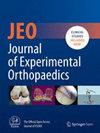Alignment rod and gap measurement methods achieve comparable alignment correction in opening wedge high tibial osteotomy for varus osteoarthritic knees
Abstract
Purpose
To compare clinical and radiological outcomes of medial opening wedge high tibial osteotomy (MOWHTO) using two different alignment methods: the alignment rod (AR) versus the gap measurement (GM) method. The primary outcome was to report the surgical accuracy of coronal plane corrections in each method.
Methods
Patients who underwent MOWHTO with either AR or GM method between 2014 and 2022 at a single institution, with a minimum of 2 years of follow-up, were included. The opening gap was gradually spread with an AR under fluoroscopic control in the AR group, whereas the osteotomy site was opened to the value of the measured gap distance in addition to the thickness of the bone saw in the GM group. Radiological assessment of geometric characteristics included hip–knee–ankle angle (HKA), medial proximal tibial angle (MPTA), mechanical lateral distal femoral angle and joint line convergence angle. Surgical accuracy, which is the deviation (Δ) between the intended and achieved correction, was compared between both methods. Clinical outcomes were assessed using the Knee Injury and Osteoarthritis Outcome Scores.
Results
A total of 110 patients (n = 110 knees) with a mean age of 54.1 ± 8.4 years were included in the study. Radiological parameters were significantly improved as reflected by HKA correction from 171.6° ± 2.0° to 181.1° ± 2.6° in the AR group and from 171.0° ± 2.3° to 181.1° ± 2.8° in the GM group at 2 years (Intergroup n.s). There was no significant intergroup difference for all radiological parameters and clinical outcomes. There was no intergroup difference in the surgical accuracy as evaluated by Δvalues and absolute Δvalues of both HKA and MPTA (n.s).
Conclusions
Comparable correction accuracy was achieved in MOWHTO using either the AR or GM method. The GM method is simple and reliable in achieving the intended correction in MOWHTO.
Level of Evidence
Ⅲ retrospective comparative study.


 求助内容:
求助内容: 应助结果提醒方式:
应助结果提醒方式:


